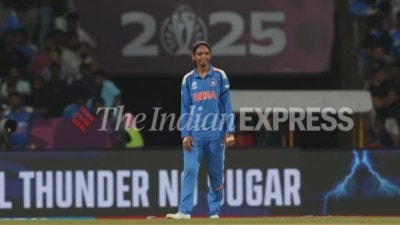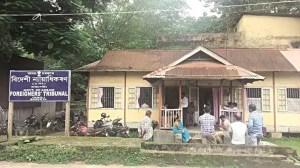Trouble in temple territory
Much as the VHP may try, its Ayodhya mobilisation will not gather momentum this time. It is trying to bring workers from different states an...

Much as the VHP may try, its Ayodhya mobilisation will not gather momentum this time. It is trying to bring workers from different states and the biggest contingents of kar sevaks are coming from Gujarat. But complete lack of local support may just turn out to be the VHP8217;s nemesis. Not only the people of Ayodhya and Faizabad but all Uttar Pradesh is against the agitation.
But what has demoralised the VHP leadership most is the tough stance of Mahant Gyandas of the Hanuman Garhi temple. The mahant claims the VHP promised Mahant Ramchandra Paramhans no agitation would be launched in Ayodhya but went back on its word soon after the seer8217;s death.
There are obvious reasons for the people of the twin cities to oppose the VHP. Recurrent mobilisation of kar sevaks brings life to a standstill. Flow of true pilgrims and tourists is reduced to a trickle. Shops find no customers. Schools shut down. Vimlendra Mohan Pratap, scion of Ayodhya8217;s former royal family, has also come out strongly against the VHP.
According to Mahant Gyandas, Ayodhya and Faizabad have a long tradition of communal harmony. Muslims are an integral part of life here. All the garlands, floral hangings and decorative offerings made at the temples are supplied by Muslim artisans.
Each time the VHP announces its programme, local Muslims leave 8212; either because they are too scared or because they are forced to. In the process, they suffer psychological and material losses.
Stressing he won8217;t allow the VHP to unleash such anarchy, Mahant Gyandas has warned the Parishad to stay away from Muslims. On October 14, a 500-strong contingent of sadhus led by Mahant Gyandas travelled to Muslim-dominated localities of Ayodhya and Faizabad and reassured panicky residents.
In another ominous development for the VHP, sadhus of OBC origin have come together against the Parishad. To top it all, Mahant Nityagopal Das has publicly expressed disappointment at Pravin Togadia8217;s provocative language.
Understandably, the VHP finds its job difficult compared to the last time, when it had eight years to gather the momentum that brought down the Babri mosque. Now it has just about eight months to the next general election.
And the Sangh Parivar8217;s temple constituency is now asking the inevitable if uncomfortable question: why did the Parivar forget all about the Ram temple in its five odd years in power in Lucknow and in New Delhi. Why this urgency before the polls?
The VHP tried to dump the blame on the prime minister by crudely attacking him the other day. But that only made the Parivar8217;s internal politics more complicated. M. Venkaiah Naidu had to defend his party8217;s poll mascot and put Togadia in his place. But the question continues to stare the Sangh in its face.
RAW deal
The Research and Analyses Wing RAW is one of the government8217;s biggest white elephants. It has an almost Rs 1,000 crore annual budget, accessible in foreign exchange. But there is no accountability. The money is sanctioned under non-plan expenditure and also escapes Parliament8217;s scrutiny in the name of confidentiality and national interest.
But whose interest does RAW serve? Maybe that of officials happily posted in European countries or in the US, Canada or Japan. This while RAW can8217;t maintain its minimum strength in a number of sensitive countries because officers flatly refuse to go there.
No wonder the idea to merge RAW with the Intelligence Bureau and make it IB8217;s foreign wing is gaining momentum. It will ensure coordination, the lack of which between RAW and IB often hampers investigation.
Another reason for RAW8217;s dismal output is the practice of repatriating experienced officers. IPS officers of 10-20 years experience in RAW have been repatriated and officers from the Railway, Postal or Forest services 8212; with no expertise or experience in intelligence work 8212; are filling the slots. Today RAW doesn8217;t have a single IPS officer at the joint secretary level.
RAW8217;s work culture has become so unprofessional that, the government has learnt, personal differences between two top officers are blocking internal coordination. So much for national interest.
The author is a Congress MP
- 01
- 02
- 03
- 04
- 05































